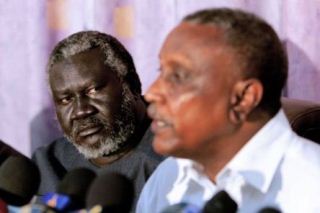SPLM-N calls on Islamic forces to sever ties with Sudanese regime
January 19, 2014 (KHARTOUM) – The Sudan People’s Liberation Movement-North (SPLM-N) called on Islamic forces in Sudan to denounce repression and war crimes committed by the security and military apparatuses following the recent measures undertaken to ban the opposition National Umma Party (NUP).

SPLM-N secretary general Yasir Arman condemned the move against the largest opposition party after the signing of the “Sudan Call” on 3 December by the NUP, National Consensus Forces (NCF) a coalition of left parties, and the umbrella of rebel groups the Sudanese Revolutionary Front (SRF).
“The forces of the Sudan Call, including the SPLM-N, stand in the same trench with Umma Party,” said Arman in a statement issued on Monday as the internal opposition forces on Sunday re-inked the Sudan Call declaration in solidarity with the NUP and detained NCF leader Farouk Abu Issa who was arrested on 6 December after the signing of the political declaration in Addis Ababa.
Addressing the Islamic forces calling for democratic reforms, Arman said the Sudanese security “apparatus tore the country apart, committed war crimes and its tyranny hit all the political forces in the country, including the Islamic Movement”.
He further appealed upon the forces of the Islamic forces to adopt “the demands of the (Sudanese) people for change, as some have already done”. He warned that their silence over the action of the military and security agency would gravely damage their reputation as they would be seen as an accomplice with the regime.
The salvation of Sudan from “Al-Ingaz Gang ” also necessarily means the salvation of the Islamic movement, which is affected from these actions,” Arman emphasised.
A militia force established by the NISS called the Rapid Support Forces (RSF) is accused of committing war crimes and atrocities in Darfur, Blue Nile and South Korodfan states.
In 2013, different Islamic factions supporting the regime within and outside the ruling National Party (NCP) denounced corruption and called for democratic reforms.
Following these calls, the security services arrested former army officers members of the Sa’ihoon, a group of former Islamist fighters and members of the paramilitary, Popular Defence Forces, after accusing them of plotting a coup d’etat.
Presidential aide Gazi Salah Eddin al-Attabani subsequently quit the party and formed a new political organisation, Reform Now Movement (RNM).
In a bid to contain the rift, president Omer Hassan al-Bashir launched a national dialogue process in January 2014, calling on opposition and rebel forces to take part, saying the internal process would discuss peace and political reforms.
However, the NISS arrested the NUP leader Sadiq al-Mahdi and other opposition leaders pushing them to distance themselves from the process, as the authorities tightened its grip on the local press and political freedoms generally.
On Sunday, Bashir renewed his calls for opposition parties to take part in the country’s general elections scheduled for April and pledged to allow them to explain their political programme and campaign freely.
(ST)
